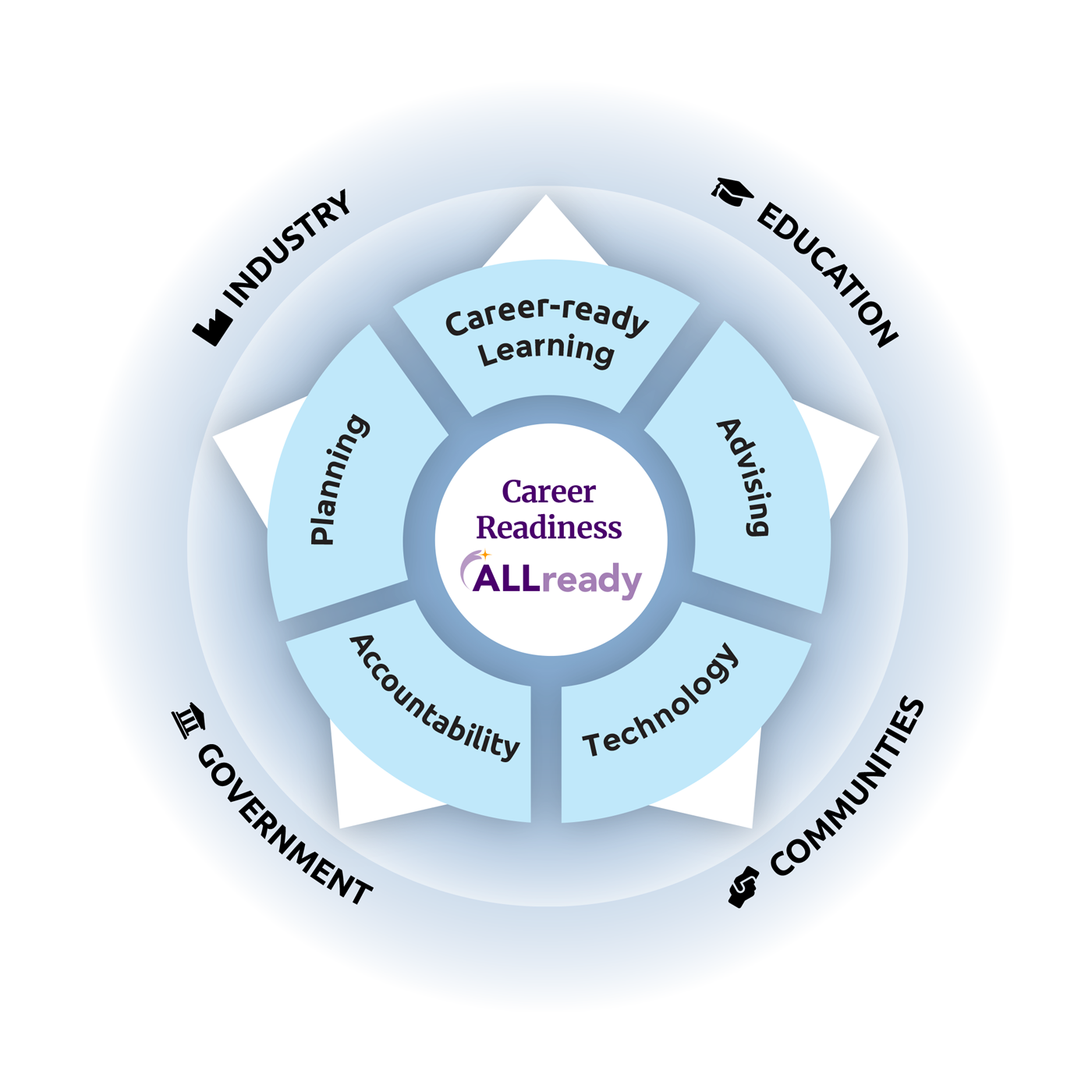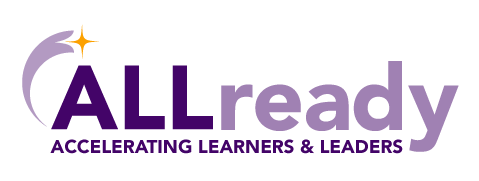Who We Are
ALLready and our corporate nonprofit, the Coalition for Career Development Center, are united around a vital mission, vision, and set of core values. All of our work builds from our Five Pillar Solutions Framework, which ensures every learner has the support to succeed and thrive in today’s workforce.
Our mission is to make career readiness for ALL the first priority of American education across the lifespan.
Our vision is for ALL individuals and communities to forge self-determined pathways to social and economic mobility.
We value a cross-sector collaborative approach to ensuring that ALL students can enter personally productive and meaningful work in their chosen career path upon graduation.
What We Stand For

ALL people
Everyone deserves an education that prepares them for their chosen career—people of all backgrounds, levels of access, types of talent, learning styles, perspectives, gifts, traits, and characteristics.

ALL sectors
Robust career readiness systems involve cross-sector collaboration between and across industries, educational institutions, government agencies, and communities.

ALL human
Human-centered education design prioritizes the needs, identities, perspectives, and aspirations of individuals and the communities they call home.
Five Pillar Solutions Framework for Career Readiness
Our organization’s work builds from five core pillars that support ALL learners’ ability to succeed and thrive in today’s employment landscape. These pillars address the entire career development lifecycle, empowering all stakeholders to promote positive change in our nation’s education and workforce development systems.

Career-Ready Learning
Career-ready learning is core learning that integrates academic, technical, and durable human skills to think and solve problems from multiple lenses, particularly different professional lenses.
It emphasizes the development of competencies, local exploration and engagement, interest-based learning, and personalized pathways. Career-ready learning can be achieved through many educational approaches, including experiential learning, profession-based learning, project-based learning, place-based learning, problem-based learning, and expeditionary learning.
Career-ready learning includes applied and work-based learning (WBL), as well as career and technical education, as part of lifelong experiences that help people understand career paths and the skills and credentials needed to succeed in them. We believe that all learners should explore various career fields to understand how to specialize, expand their knowledge, see how society works, discover potential roles, clarify their options, and build a strong understanding of their chosen paths.
Career Planning
Adult mentors initially facilitate career planning and organize learning activities designed to explore and support one’s interests, talents, values, and goals. Informed by individual strengths and employment interests, adults guide youth and young adults in developing plans that will help them attain the education, certification, and workforce development opportunities necessary to enter and thrive in high-demand, high-wage, and high-leverage occupational pathways leading to meaningful careers, entrepreneurship, wealth, and purpose. Individual career and academic plans are ideally used as a portfolio of learning experiences to track progress and celebrate growth. Young people ultimately learn to self-direct their plans with the help of their network of advisors, mentors, and coaches, as well as practical tools and technologies.
Career Advising
Career advising develops the self-exploration capabilities of youth and adults, advances career exploration opportunities, and enhances planning skills. Career specialists, mentors, coaches, and counselors have one-to-one or group roles to play in supporting individualized and sequenced activities that prepare young people developmentally, cognitively, and practically for adult roles and work responsibilities. Career advising ideally informs and is informed by individual career and academic plans.
Technology and Tools
The ability to learn, adapt to, and work with various technologies—from tools, to hardware, to software, to AI—has never been more important than in the modern era of work. Students need to “learn to learn” new technologies even more than a specific type of technology to enter and adapt to the constant changes in work environments. Besides technologies FOR work, career development technologies can be used to learn ABOUT work. They can enhance learners’ career planning, exploration, applied learning, work-based learning, and other virtual or hands-on engagement in career-building activities.
Ensuring Accountability
Accountability means establishing clear, consistent, and mutual standards among industry, education, government, and community to ensure all individuals are career-ready. It includes input measures and outcome indicators for career readiness and development at both the state and national levels. It requires schools, employers, states, and other stakeholders to measure progress toward these goals.
Transformational Practice Dimensions
ALLready’s work supports leaders in all sectors to adopt strategies and behaviors across seven key Transformational Practice Dimensions. These dimensions categorize the critical adult practices required to nurture career-ready young people. The dimensions map to a four-stage development cycle that helps deepen career readiness strategies and accelerates progress from vision to action.

Initiate
Leadership Levers – How to create and achieve the vision together
Learning Landscape – What young people need to know and be able to do
Cultivate
Professional Preparation – What educators, mentors, and supervisors of young people need to know
Resource Readiness – What schools need to succeed and what partners, systems, and communities can provide
Implement
Everyone Engaged – Whom to engage to effect change and sustain effort
Student Support – How to make sure each young person gets what they need
Sustain
Compliance Concerns – How to follow the rules and navigate the system
